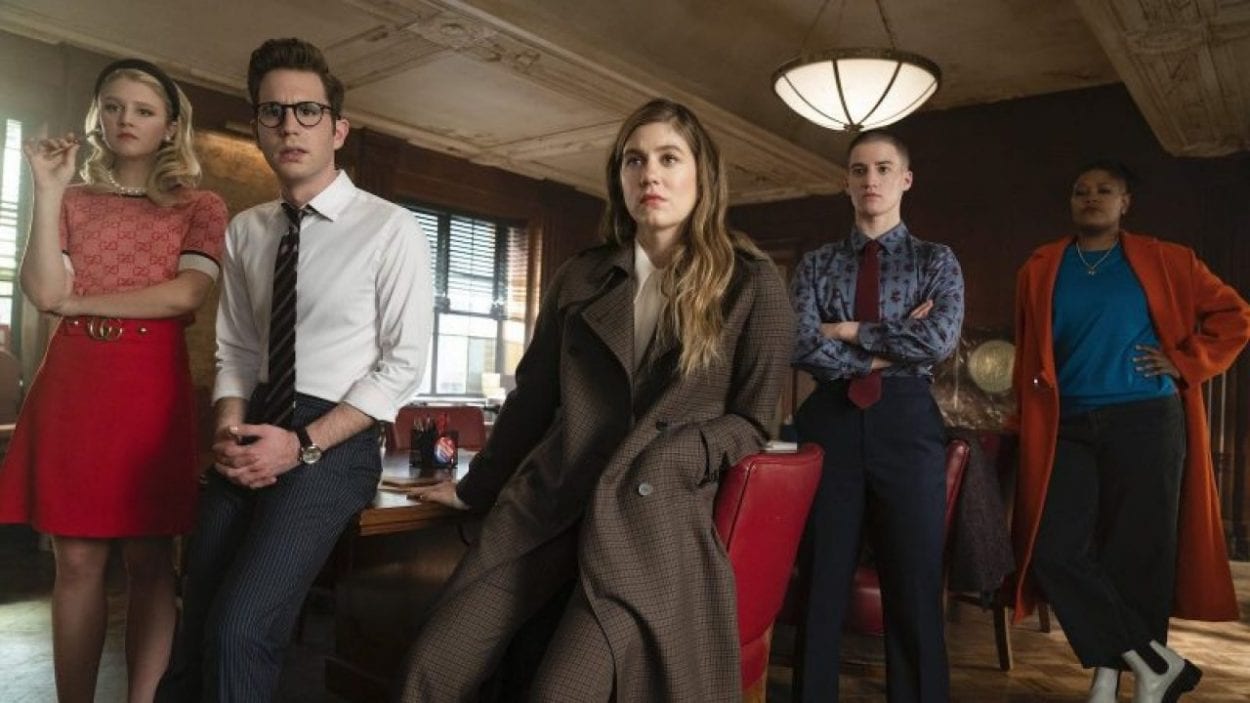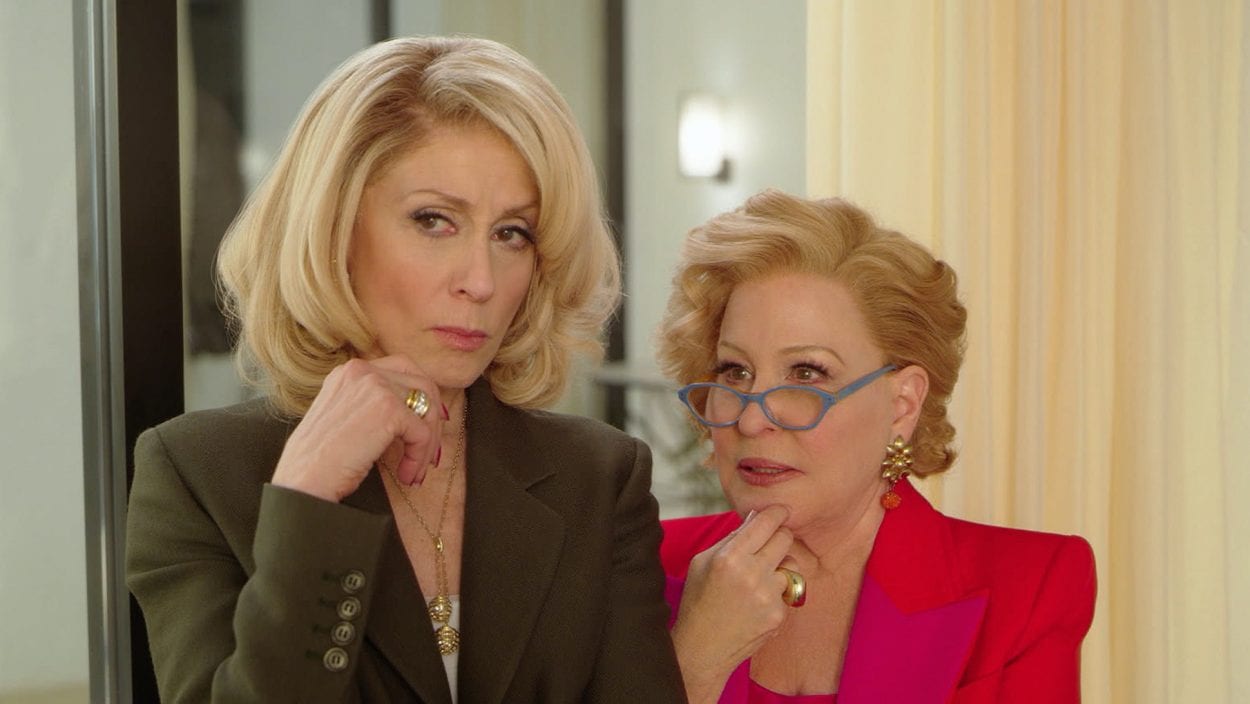The following contains spoilers for The Politician Season 2.
Time jumps don’t often go over well in television. Unless you are a show that is running out of steam. In a lot of ways, that is how the first season of Netflix’s The Politician felt until it took a time jump in the final episode and transported us to shiny New York City. Enter Season 2, in which Payton’s (Ben Platt) State Senate campaign is running full steam ahead against incumbent Dede Standish (Judith Light). Gone are the wallowing montages of Payton crying over self-sabotaged dreams! His passion—and the show’s passion—is renewed with a fiery vigour.
Since AOC, no incumbent is safe. – Dede Standish, Episode 6
I’m not going to pretend to be an expert in American politics or New York City politics, but I know enough to have a conversation. And maybe part of the fun and allure of The Politician is you don’t need a Poli-Sci degree to feel tuned in. This accessibility, though, may be its double-edged sword. On the one hand, it’s fun, soapy, satire. But this approach also lacks depth or analysis and fails to make a fully-formed point most of the time. That said, it does ask a lot of good questions…or at least produces a lot of good questions in retrospect.

Like Season 1, the second season also struggles with the concept of authenticity in politics. In its good moments, it uses River (David Corenswet)—an extension of Payton’s subconscious— or Georgina (Gwyneth Paltrow) to dive into who Payton actually thinks he is. Is he a good person? Debatable. Well, debatable at least to Payton. I, and basically every other character on the show, know he is a compromised person, to say the least. Perhaps the best moment this is overtly stated is in a justified monologue from Peyton’s pregnant fiancée:
I don’t think you’re a bad person. I think that you’re indifferent to morality and ethics. I think you struggle with these kinds of ethical conundrums because you think that you’re supposed to. But you only choose the side of light when it means that you’ll still probably get what you want. – Alice (Julia Schlaepfer), Episode 6
It’s a quote that feels particularly relevant in a time when there is an outcry for change in systems and institutions. Yet most of those in power function in a way that signals support, but doesn’t rock the boat enough to affect their own lives. Were the show to go a little bit deeper, this could’ve been an effective critique of white privilege, but I don’t know if this show is capable of that. The Politician—like Payton—is hellbent on getting him to the oval office, and this self-important mission overrules a deeper analysis that could ultimately benefit it.
A lot of the season is spent on the issue which Payton is advised to take on most fervently, which is climate change. Gone are his critiques of the New York City subway system, which appeared to be his loudest critique at the end of last season. Enter climate change and a reinvigorated author-turned-activist Infinity Jackson (Zoey Deutch). No doubt this is an important issue, but it’s strange that it’s heavily framed as an individual issue instead of a corporate and military issue. Is this the point that they’re making? Is Infinity’s all-my-trash-from-one-year-fit-in-a-mason-jar moment supposed to accentuate the fact that it’s not an individual issue or is it just convenient that I asked that?
When The Politician Season 2 uses this plotline to its best is when it gets at the generational gap present in this thinking. Episode 5 “The Voters,” starring Susannah Perkins and Big Little Lies’ Robin Weigert as a politically-estranged mother/daughter voter duo, acts this out for us. It’s a fast-paced episode that manages to show the hypocrisy present in both Payton and Dede’s campaigns, while also tackling a Boomer’s shift to voting for a Millennial, and laying the pavement for a more complex viewpoint of Dede’s politics.
My daughter cares for the planet more than she cares about her own economic future. Unlike us. I mean, your generation, my generation. She literally does not care if she never owns a house or a car. She just wants to make sure she has clean air and water, and that we don’t end up with a climate refugee crisis. – Andi Mueller (Robin Weigert), Episode 5
It’s heartwarming to see Andi take responsibility for her generation’s contribution to climate change. Her daughter hugs her closer after she tells her she voted for Payton instead of Dede, which is a sweet moment, albeit a little over-simplistic. Where this moment feels most complete is when there is a deeper discussion in later episodes about the rights Dede had to fight for over her career that many Millennials and Gen Zs assume are just basic rights. Dede is not completely out of touch with the district and its desires as she is originally framed. In fact, she helped shape the liberal foundation of it.

But for every issue that The Politician Season 2 takes on somewhat successfully, there are three or four that it fails to really engage with. (See: cancel culture, polyamory, cultural appropriation, emotional psyche formation.)
Cancel culture-wise, it asks an interesting question of “when does a person get uncancelled?” but doesn’t really get past that or offer any insight there because Payton doesn’t really get “cancelled.” He just kind of has a scandal that blows over after he apologizes. In a time when past Halloween costumes are pointing to a larger problem in the corporate psyche, I do wish more consequences were dealt to Payton here. Or more comparison was drawn between the fallout after a scandal of a man in politics vs. a woman. Sure, The Politician talks about how the public views them after a scandal, but it doesn’t really go further in time to analyze that.
Anyway, in the universe of The Politician, cancel culture is a joke or a flippant Millennial response…but that takeaway kind of lacks the nuance of what cancel culture hits at or questions. Let’s go back to the environmental generational gap that Season 2 did a decent job of talking about. What if that same lens was afforded to the cancel culture plotline—what if cancel culture is a generation’s way of correcting because for so long there were little-to-no consequences when someone in power did something offensive? What if cancel culture is a way of evening out who gets access to a platform?
But these questions aren’t being asked in The Politician because room isn’t made for them. Instead, more time is spent on (Payton’s mother) Georgina’s Governor run in the state of California, which is the plotline that made the least sense and drove the season the most off the cliff (if, you know, there are degrees of being driven off a cliff). If Season 1 was about Georgina yearning for a deeper purpose than her marriage, Season 2 is about her finding that purpose and using her energy to create a better country (see: initially wanting California to be a separate country).
It’s an intriguing plotline and Gwyneth Paltrow is both funny and heartbreaking depending on the scene, but it also takes away from the effectiveness of everything going on in Payton’s campaign, and overall storyline. I know Gwyneth Paltrow is an Executive Producer and married to co-creator Brad Falchuk, so I know this wouldn’t have happened, but I do wonder if this season would’ve been stronger without her character. Sure, she is wonderful emotional support and really helps Payton figure himself out. She also is used as a setup to Payton’s eventual journey to the oval office, because somehow she becomes President at the end. But that all felt too clean. Payton was just set up for his shot at the oval office in four years! He had no consequences from well…anything in the second season that he (and his campaign) did wrong.
Therein lies my biggest issue with the second season, which is how optimistic and clean the ending is. If Millennials and Gen Zs just register to vote, all will be well! The “evil” will be defeated! Someone like Georgina Hobart is in power! And Payton will make a bunch of environmentally conscious decisions as state senator! The season ends as unrealistically bright with optimism as its Netflix sister show Hollywood. I half-expected a register to vote PSA at the end of this season because that’s really where we went by the end, but thankfully it wasn’t that on-the-nose.
Angela Davis once wrote: “It is in collectivities that we find reservoirs of hope and optimism.” Don’t get me wrong, optimism itself is not the issue. When it’s used on Ryan Murphy’s other show Pose, it feels powerful and truthful. But when The Politician uses it, it feels unearned. That’s largely because of the privilege of the characters…and the lack of interrogation that privilege gets in this season…and ending. Sure, Payton puts a bunch of environmental things in place after he becomes state senator, but aren’t his new eco-friendly buildings contributing to gentrification in some way? Isn’t that just environmental racism? (Or is that just the new Sims 4 expansion pack in real life?)

I know I’ve been a bit harsh on this show but the mixture of semi-successful satire with optimism is just not a great note for the palate. I’m not saying The Politician‘s not entertaining, though. I’m just wishing it took itself a bit more seriously. That it had a little bit of the political boldness of The Good Fight. The questions about monogamy with the nuance of Succession. That it dealt with gentrification like Vida. The New York City satirical bite of Unbreakable Kimmy Schmidt. The political brashness of Hulu’s The Great.
I know that’s a tall order, but I just want a material that matches the talent of its cast. More material for the talents of its supporting McAfee (Laura Dreyfuss), James (Theo Germaine), and Skye (Rahne Jones). More engagement with Judith Light’s Dede Standish, and more time to shine for Bette Midler’s scene-stealing Hadassah Gold. The peppering out of Ben Platt’s Grammy-winning singing. More Beto O’Rourke-esque weirdness for Sam Jaeger’s Tino McCutcheon. More to do for Feud‘s excellent Jackie Hoffman besides just flipping the bird. More moments of humanity for Lucy Boynton’s Astrid and Julia Schlaepfer’s Alice that aren’t just pregnancy-related.
This is not like the list of demands that Infinity issues to Payton in order to continue receiving her support, I will still watch The Politician if and when a third season comes out! I’m still invested in Payton’s journey in the long run and am curious how he would choose to run America. However, I do wish that the show—and protagonist—were a bit more concerned with the legacy they left behind instead of just cashing in on the quick punchline. But when is a politician ever really concerned about that? And maybe that’s the point…but also the problem.

